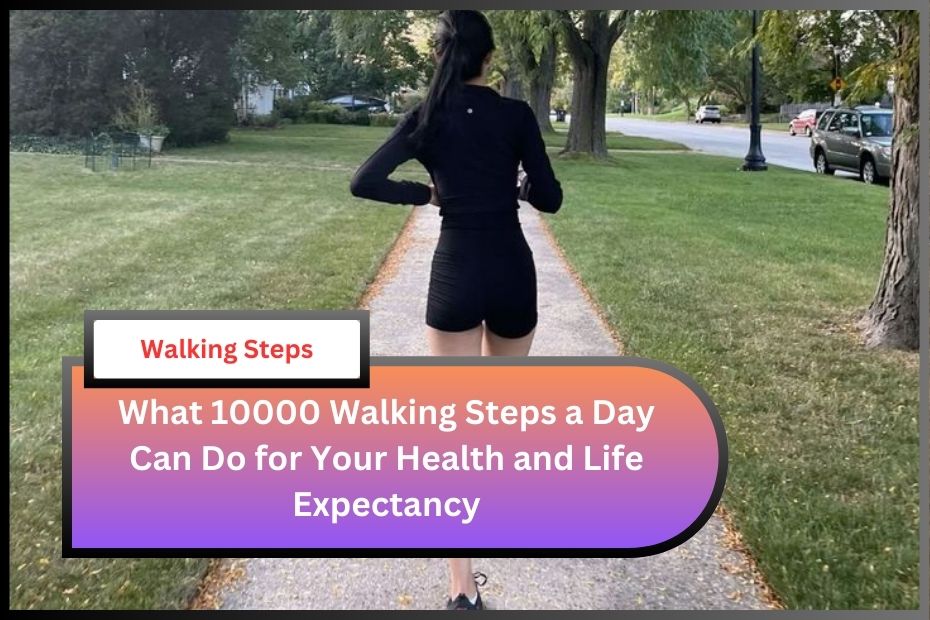Walking Steps is a simple yet powerful exercise that can help improve your health and increase your lifespan. But many people don’t get enough steps in their daily routine, and this can be harmful to their well-being. Research shows that walking more can reduce the risk of chronic diseases and even help you live longer. Let’s dive into how many steps you should take every day for better health and longevity.
Why Walking is Important for Your Health
In today’s world, many people spend long hours sitting, whether at work, in school, or even while traveling. This lack of movement can lead to various health problems, including heart disease, diabetes, and back pain. Dr. Eric K. Holder, a physiatrist from Yale Medicine, emphasizes that prolonged sitting is a major health problem. It’s not just about physical activity—it’s about breaking up long periods of inactivity. Walking is an easy way to stay active and support your overall health.
How Many Steps Are Enough?
So, how many steps should we take every day to stay healthy and live longer? According to a large study published in Lancet Public Health, the ideal amount of steps varies based on age. The study analyzed 15 different studies with over 50,000 people and found that 8,000-10,000 steps per day is the sweet spot for most people.
It’s important to note that the speed at which you walk doesn’t matter as much as the number of steps. The key is to move more. For older adults (over 60), walking 6,000-8,000 steps per day can still be very beneficial. For younger adults (under 60), 8,000-10,000 steps is optimal for reducing the risk of early death.
The Benefits of Walking More
Walking more is linked to many health benefits, including:
- Improved Heart Health: Walking strengthens your heart and lowers your risk of heart disease.
- Reduced Stress: Walking can help clear your mind and reduce anxiety and stress.
- Better Joint Health: Regular walking keeps your joints moving and reduces the risk of arthritis.
- Weight Management: Walking helps burn calories and maintain a healthy weight.
The research shows that people who walk at least 8,000 steps per day are more likely to live longer and experience fewer health problems.
Tips to Help You Reach Your Step Goal
If you find it hard to get 6,000-8,000 steps a day, don’t worry. Here are a few tips to make walking easier and more enjoyable:
- Walk with Friends: Walking with a friend turns exercise into a social activity, which can boost your mood and help you stay motivated.
- Use a Treadmill: If you don’t have time to go outside, a treadmill is a great option. It provides a smooth surface for walking and can be done while watching TV or listening to music.
- Take Short Walks Throughout the Day: You don’t have to do all your walking at once. Try taking short 10-minute walks throughout the day, like walking during lunch or after dinner.
- Track Your Steps: Use a step tracker or a fitness app to keep track of your steps and motivate yourself to reach your daily goal.
The Power of Socializing While Walking
Walking with others not only helps you stay active but also has social benefits. According to experts at Harvard Health, walking with friends or family can reduce feelings of loneliness and improve mental health. Socializing is essential for preventing depression, reducing stress, and keeping your heart healthy. Walking with a friend is an easy and fun way to get in your daily steps while enjoying good conversation.
Conclusion
Getting enough steps every day is essential for maintaining your health and improving your lifespan. The research suggests that walking 8,000-10,000 steps daily is the key to better health. It doesn’t matter how fast you walk—what matters is that you move more. By adding walking into your daily routine and making it enjoyable with friends or a treadmill, you can enjoy the long-term benefits of improved health and increased longevity. So, start walking today to boost your health and add more years to your life.
FAQs
Why is walking 10,000 steps a day recommended?
Walking 10,000 steps helps improve heart health, manage weight, and boost overall longevity.
Does walking speed matter for achieving health benefits?
No, the number of steps matters more than speed—just keep moving.
How can I make walking 10,000 steps a day easier?
Break your walks into smaller sessions or walk with friends for motivation.

